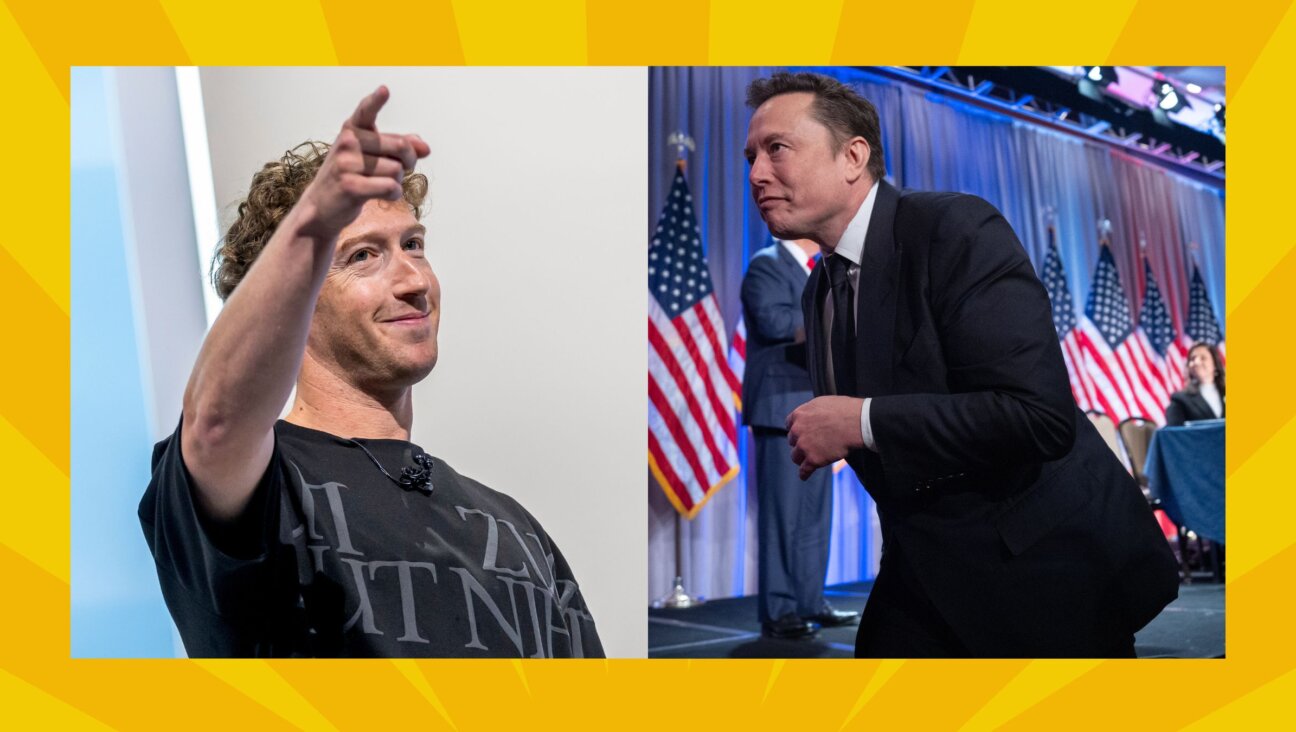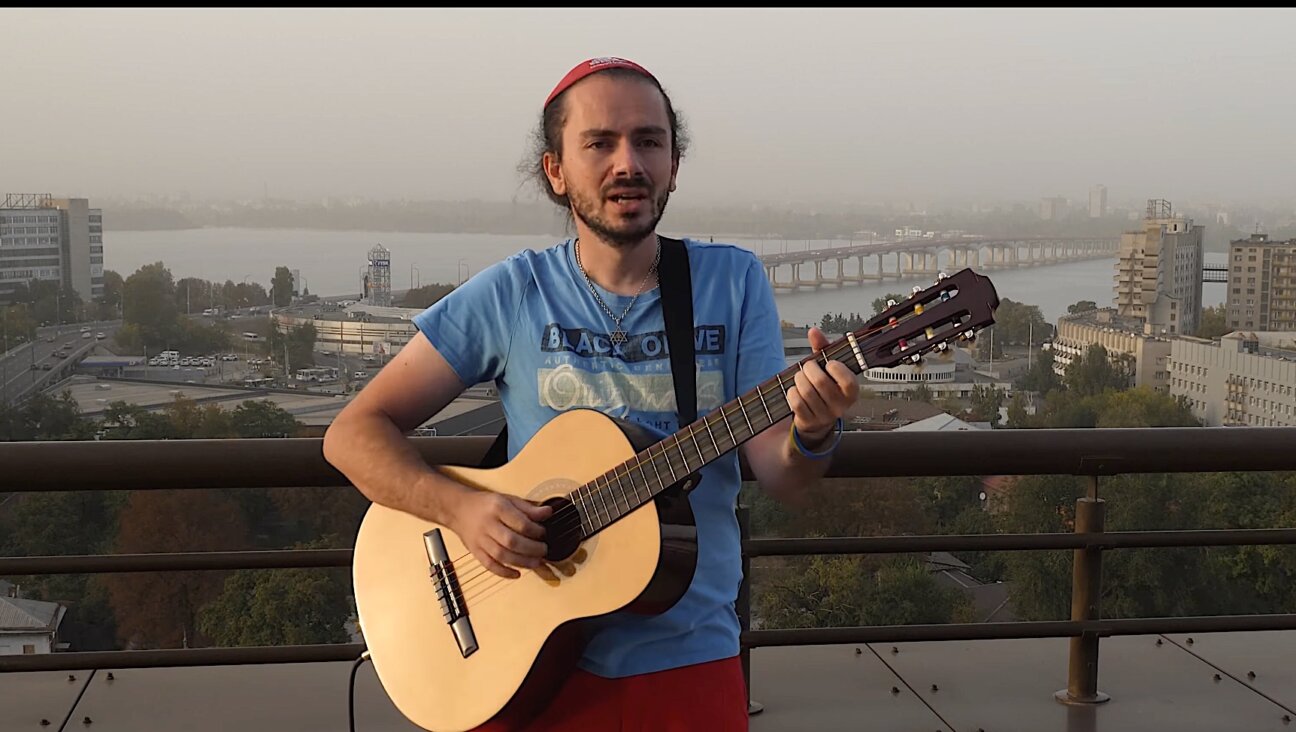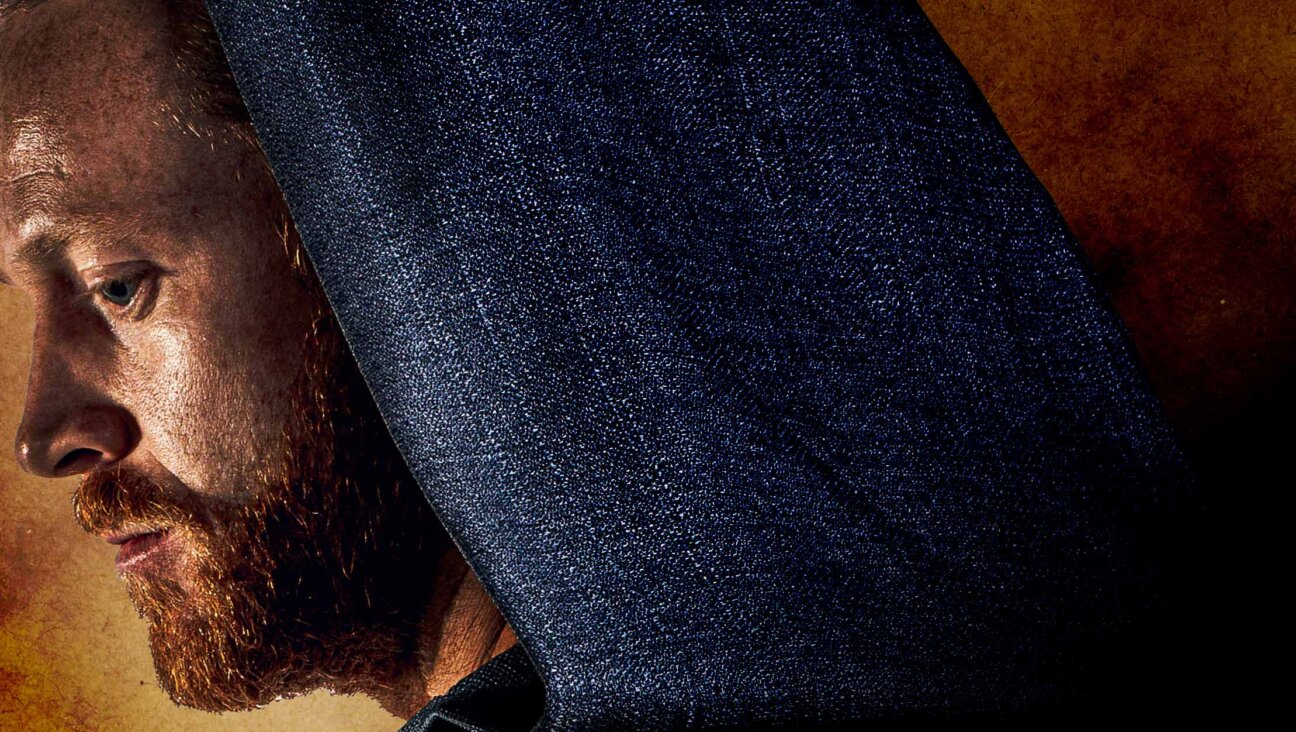Ukrainians Cling to Belief That Demjanjuk Is Innocent

Convicted: John Demjanjuk (center) was sentenced to five years in prison by a German court for his role as a guard at the Sobibor death camp in Poland. Born in Ukraine, Demjanjuk is 91. Image by Getty Images
Forget for a moment that John Demjanjuk is guilty.
Forget what a German court has just concluded: that he was a camp guard at Sobibor between March and September 1943, when 28,060 mostly Polish Jews were murdered.
Imagine instead that Ukrainian-born Demjanjuk, 91, is an innocent, elderly man who has been hounded for 34 years by three governments — American, Israeli and German — for crimes he never committed. You’ll begin to understand the very different way that most people in the Ukrainian-American community have come to view this epic case.
“There’s no logic to it,” said Wasyl Liscynesky, an acquaintance of Demjanjuk’s from the middle-class Cleveland suburb of Parma, near where Demjanjuk lived peacefully for 25 years. “There’s no justice in it,” he added. “There’s no humanity.”
Liscynesky, president of the United Ukrainian Organizations of Ohio, sees what happened on May 12 in a Munich courtroom as a travesty. Echoing the sentiments of his community, Liscynesky wants Demjanjuk returned to America so that he can live out his remaining years close to his son and two daughters.
The likelihood of Demjanjuk returning to Ohio is slim; his American citizenship was revoked in 2009, shortly before he was extradited to Germany. Nevertheless, Archbishop Antony, head of the Eastern Eparchy of the Ukrainian Orthodox Church of the USA, said that he wanted to find an American home for Demjanjuk while he appeals his five-year sentence.
“I would hope the government would show some mercy,” Antony told The Associated Press. “He’s paid his dues.”
Antony added: “I don’t know anyone who really believes the man has any guilt at all.”
Though almost no one shares their views, the belief among many in the 1.5 million strong Ukrainian-American community that Demjanjuk is innocent is not without some connection to reality. After all, he has been found guilty — and has been vindicated — before.
In 1988, Demjanjuk was convicted by an Israeli court of being a notoriously brutal camp guard at Treblinka known as “Ivan the Terrible.” He spent six years on death row and was nearly executed. Only the release of papers from the Soviet archives, following the fall of the Soviet Union, in 1991, revealed that another man — Ivan Marchenko — was the real monster.
That Israeli court conviction was secured by eyewitness testimony. Three former prisoners positively — and, it turns out, erroneously — identified Demjanjuk as “Ivan the Terrible.”
In this new trial, which began when Demjanjuk was extradited to Germany in 2009, a key piece of evidence against him was an SS identity card that placed Demjanjuk at Sobibor. But in April, The Associated Press discovered an FBI report from 1985 that suggested the identification card was a communist fake designed to smear anti-Soviet émigrés. In light of the new evidence, Demjanjuk’s lawyers pushed unsuccessfully for his Munich trial to be suspended.
But even if Demjanjuk was a camp guard, and even if he participated in the murder of thousands of men, women and children, a swath of the Ukrainian-American community still claims sympathy for him.
The reason is buried in Ukraine’s complicated history as a country divided and ruled over by various powers for centuries — a nation that, along with Poland and Belarus, bore the brunt of Soviet and Nazi brutality during the 1930s and ’40s.
Indeed, Ukraine lies at the heart of what Yale historian Timothy Snyder has labeled the “Bloodlands,” a vast killing ground between Berlin and Moscow in which 14 million people were murdered between 1933 and 1945.
That figure includes millions of Jews. But the first mass killing, in 1933, was the orchestrated starvation of 3 million Ukrainian peasants by the Soviets. (Many Ukrainians say that the figure is closer to 7 million dead.)
During the Second World War, another 3 million Red Army prisoners of war, like Demjanjuk, who was captured in 1942, starved to death in Nazi concentration camps. For many, collaboration was the only way out.
“One would say that [collaboration] was terrible,” said the Rev. John Nakonachny of St. Vladimir Ukrainian Orthodox Cathedral, in Parma, “But I ask anyone, are you capable of saying, ‘Shoot me now; I will not go and do that job. I will not be a guard. I will not do anything else you want me to do’?” How many people would be brave enough to do that?”
During Demjanjuk’s trial in Germany, Nakonachny ministered to him regularly via telephone calls. Though he believes in Demjanjuk’s innocence, during a lengthy interview Nakonachny returned often to the subject of how young the Soviet prisoners of war were back then, many of them in their teens and early 20s. Demjanjuk was 23 at the time.
He also emphasized that following the famine, Ukrainians were — and remain — only too aware of the horrors of genocide.
“We completely understand the tragedy and the horror of the Holocaust,” said Tamara Olexy, president of the Ukrainian Congress Committee of America. “But if you look at what’s going on now, it looks like a judicial system being used for political ends.”
Ukrainian Americans, like Olexy, want to know why a Ukrainian is being tried for what they see as a German crime. And why, if Germany is prepared to prosecute a low-ranking camp guard, is Germany not pursuing “every cog in the Nazi apparatus”?
It was a sentiment shared by Nakonachny. “I imagine they should go after all those elderly Germans, probably in nursing homes now, waiting for the Lord to call them for roles they played in the camps,” he said.
In other words, even if Demjanjuk is guilty, he is innocent: a concept, one imagines, that the relatives of Demjanjuk’s victims could never even begin to accept.
Contact Paul Berger at [email protected]
A message from our CEO & publisher Rachel Fishman Feddersen

I hope you appreciated this article. Before you go, I’d like to ask you to please support the Forward’s award-winning, nonprofit journalism during this critical time.
At a time when other newsrooms are closing or cutting back, the Forward has removed its paywall and invested additional resources to report on the ground from Israel and around the U.S. on the impact of the war, rising antisemitism and polarized discourse.
Readers like you make it all possible. Support our work by becoming a Forward Member and connect with our journalism and your community.
— Rachel Fishman Feddersen, Publisher and CEO























